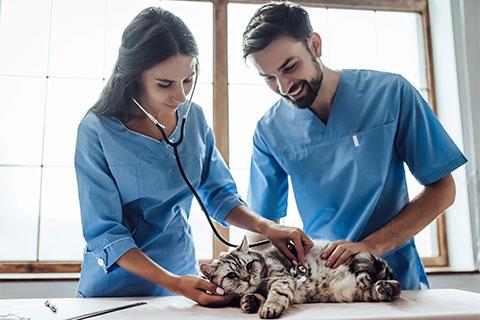Description
Course Overview:
This is a 100% online, asynchronous course. The first three weeks of this course will introduce the general principles of toxicology, including the history and definition of key toxicological concepts. The next six weeks will be dedicated to reviewing the toxic responses of specific target organs/systems, and examples of common toxicants affecting those organs/systems will be provided. Eleven of those examples primarily affecting small animals will be reviewed in much greater detail during the last four weeks of the course. Other examples provided can affect both large and small animals, and some of most important intoxications impacting only cattle or horses will also be covered briefly.
During the tenth week and eleventh weeks of the course, students will be introduced to basic principles involved in the diagnosis, treatment, and prevention of common veterinary intoxications, especially those frequently encountered in mixed animal veterinary practice in the Midwestern United States. Finally, during the last four weeks of this course, students will be reacquainted with eleven of the most common small animal intoxications, all of which were already introduced during weeks four through nine. Students will be expected to be familiar with the common sources of the toxic principles, clinical signs, common differential diagnoses for those clinical signs, and more detailed steps commonly utilized in the diagnosis treatment, and prevention of these specific intoxications.
Prerequisites:
As this certificate program is for continuing education, all certificate seekers must be current veterinary technicians or veterinarians. Must already have an AAS or BS in Veterinary Technology or a Doctor of Veterinary Medicine (DVM or VMD). Inquire for additional information on prerequisites and approval to enroll.
Learning Outcomes:
Upon successful completion of this course, students will be able to:
- The history of toxicology and the definition of key toxicological concepts.
- Responses of specific target organs/systems to toxic insult caused toxicants.
- Basic principles of the diagnosis, treatment, and prevention of veterinary intoxications
- The basic critical facts about the eleven most common small animal intoxications.
Course Topics:
- History and Scope of Toxicology
- Principles of Toxicology
- Mechanisms of Toxicity
- Absorption and Distribution of Toxicants
- Biotransformation
- Intro to Blood & Toxic Responses of Blood
- Intro to Cardiovascular System & Toxic Responses of Cardiovascular System
- Intro to Respiratory System & Toxic Responses of the Lungs
- Intro to GI Tract & Toxic Responses of GI Tract
- Intro to Liver & Toxic Responses of Liver
- Intro to Kidneys & Toxic Responses of Kidneys
- Intro to Nervous System & Toxic Responses of Nervous System
- Diagnosis, Treatment & Prevention of Intoxications
- Common Small Animal Intoxications
Instructor(s):
Tim J. Evans, DVM, MS, PhD, DACT, DABVT
Associate Professor
Department of Biomedical Sciences
College of Veterinary Medicine
University of Missouri
Columbia, MO 65211
Length:
16-weeks
Department:
College of Veterinary Medicine | Veterinary Technology
Credit:
4.5 Continuing Education Units (CEUs) or 40 continuing education hours.
Note: Participants have a personal responsibility to maintain a record of programs attended for continuing education and to assess the applicability of each program for their area of expertise. 1 CEU = 10 contact hours
Audience:
Veterinarians and Veterinary Technicians for Continuing Education
Accommodations
University of Missouri Extension complies with the Americans with Disabilities Act of 1990. If you have a disability and need accommodations in connection with participation in an educational program or you need materials in an alternate format, please notify your instructor as soon as possible so that necessary arrangements can be made.
Cancellations and Refund Requests
Access MU Extension’s Course Cancellation and Refund Policy for details.
